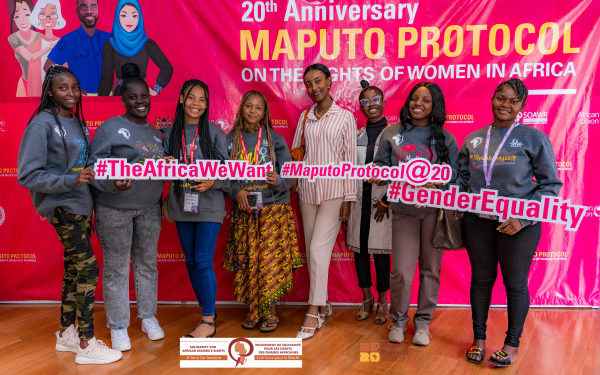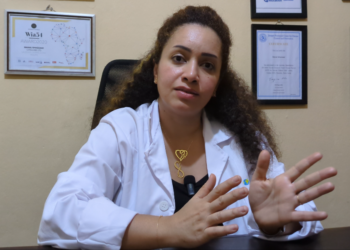African governments should prioritize eliminating harmful traditional practices, gender-based violence, and discrimination against women and girls, a coalition of women’s rights organizations have said.
The campaigners made the appeal in commemoration of the 20th anniversary of the Maputo Protocol, an international legal instrument that seeks to promote and protect women’s rights in Africa.
The coalition comprising the Solidarity for African Women’s Rights (SOAWR), Equality Now and Make Every Woman Count (MEWC) published a report to coincide with the anniversary, which highlights progress in the last two decades and challenges faced in the implementation of the provisions of the Protocol.
The report, titled: ‘20 Years of the Maputo Protocol: Where are we now?,’ summarizes the progress made towards the ratification, domestication, and implementation of the Protocol, highlighting key achievements and challenges. It reveals that while significant progress has been achieved over the period, challenges remain.
The report, launched at a ceremony in the Kenyan capital, Nairobi on July 11, features a series of detailed case studies illustrating some of the key achievements and challenges faced in efforts to advance gender equality. It also contains recommendations from SOAWR member organisations to support States in their continued efforts toward advancing gender equality.
SOAWR is a coalition of over 80 civil society organizations working across 33 African countries to protect women’s and girls’ rights, with focus on the provisions of the Maputo Protocol.
The Maputo Protocol, short for the ‘Protocol to the African Charter on Human and Peoples’ Rights on the Rights of Women in Africa, was adopted by the African Union (AU) in July 2003 in the Mozambiquan capital city of Maputo. It is said to be one of the most ratified instruments in the sub region, with 44 out of 55 Member States having ratified or acceded to it. Eight other countries have signed but not yet acceded to it as of June 2023.
“The Maputo Protocol holds immense importance as a legal instrument for the promotion and protection of women’s rights in Africa. It addresses crucial issues affecting women’s lives, serves as a comprehensive legal framework, promotes women’s empowerment and participation, and establishes a system of accountability for African countries. All this fosters a culture of transparency and progress in the promotion of gender equality,” the coalition said in a press statement shared with ManoReporters.
Among others, the report notes that while 80% of AU Member States have ratified or acceded to the Protocol, the full implementation of its provisions is still a work in progress, with some States submitting reservations to modify the legal effect of certain provisions.
Among the areas of notable progress include economic and social welfare rights, legislation on marriage rights, health and healthcare for women and girls, women’s participation in political and decision-making processes, and protection from violence and armed conflict and specially protected women.
The report however reveals that this progress is not evenly distributed, with some areas showing better outcomes for women compared to others. There is also a concern about reporting by member states. Only 19 states have submitted initial reports as required by the Protocol, and most of them significantly delayed, the report reveals.
The women’s campaign groups want to see increased training of Member States on reporting, strengthening data collection and collation through cross-sector collaboration, and improved clarity on reporting deadlines. They also called for the African Commission (ACHPR) to consider increasing the reporting time frame.
The women’s groups say having reservations is preferable to States not adopting the Protocol. They are therefore urging the eleven AU member countries – Botswana, Burundi, Central African Republic, Chad, Egypt, Eritrea, Madagascar, Morocco, Niger, Somalia, and Sudan – which are yet to ratify the protocol, to do so.
Faiza Mohamed, Africa Regional Director at Equality Now, said at the special event in Nairobi that harmonizing national laws with the principles outlined in the Maputo Protocol and addressing deeply entrenched societal beliefs are crucial steps towards gender equality.
Equality Now is an international human rights organization that works to protect and promote the rights of all women and girls around the world. Its campaigns are centered on four program areas: Achieving Legal Equality, Ending Sexual Violence, Ending Harmful Practices, and Ending Sexual Exploitation, with a cross-cutting focus on the unique needs of adolescent girls. The NGO combines grassroots activism with international, regional, and national legal advocacy to achieve legal and systemic change that benefits all women and girls, and it works to ensure that governments enact and enforce laws and policies that uphold their rights.
“As everyone continues on the journey to uphold the rights of women and girls under the Maputo Protocol, the hope is that AU member states will embrace a multi-sectoral approach to fast-track the fulfillment of their obligations,” said Mohamed.
“Ratifying the Maputo Protocol sends a powerful message that states are committed to protecting and promoting women’s rights,” added Rainatu Sow, Director of Make Every Woman Count.
Kenya’s Cabinet Secretary for Public Affairs, Gender and Affirmative Action, Aisha Jumwa, was the Chief Guest of Honour at the event. She called on African nations to recommit and accelerate resources toward realizing its goal.
“The Maputo Protocol stands at a crucial moment whereby beyond earning recognition as one of the most important and progressive frameworks on women’s rights, there is need for countries to reaffirm their commitments, accelerate efforts and deploy adequate resources in order to realize the aspiration of all women and girls in Africa,” she said.






















